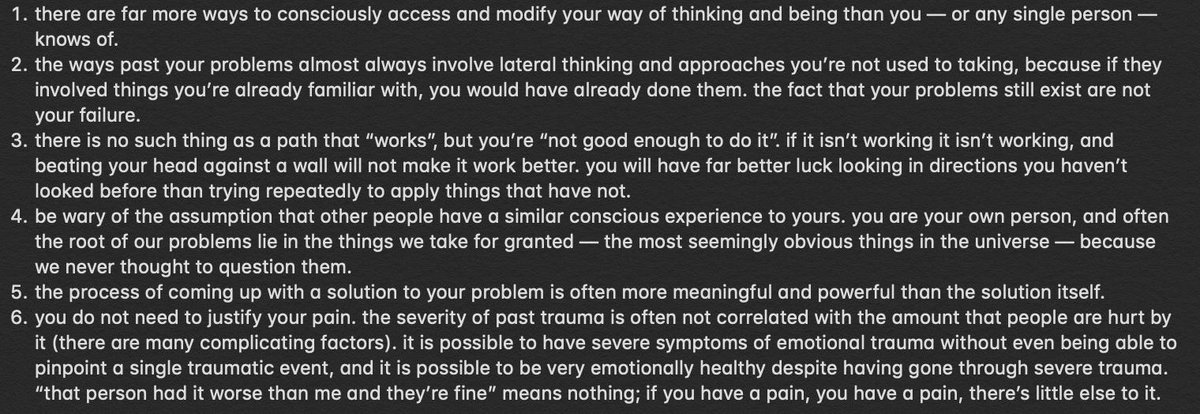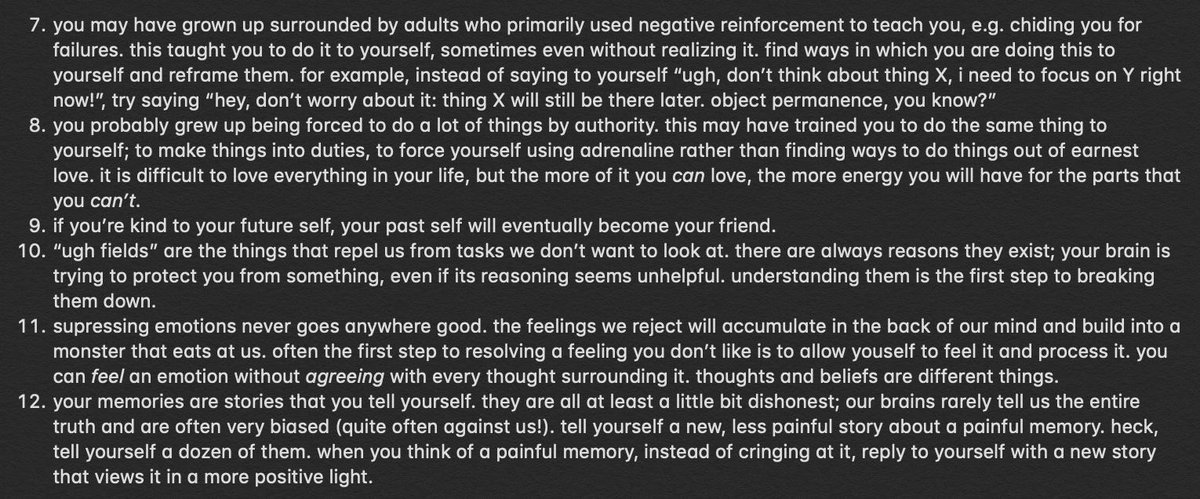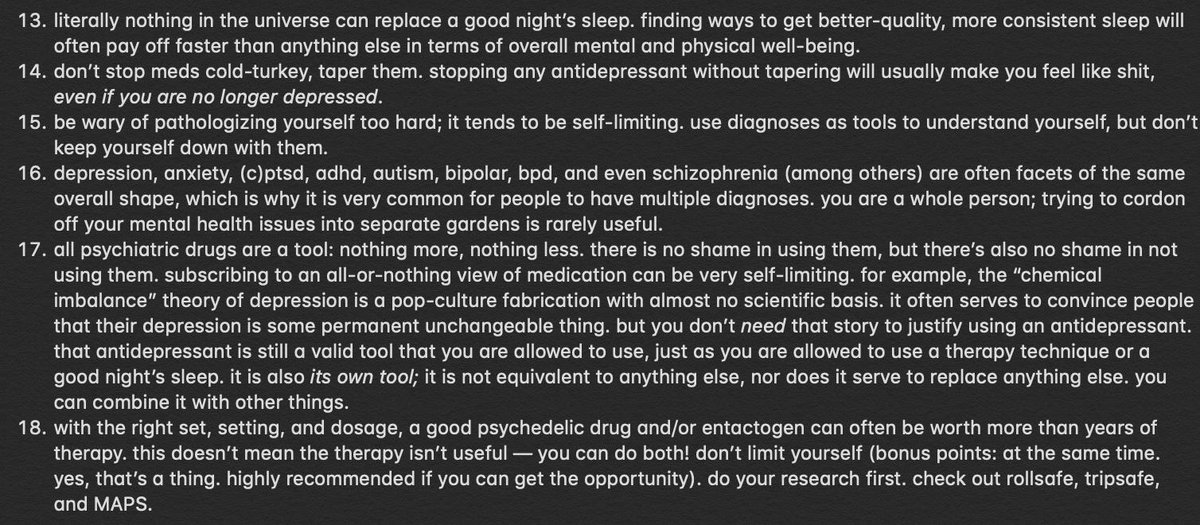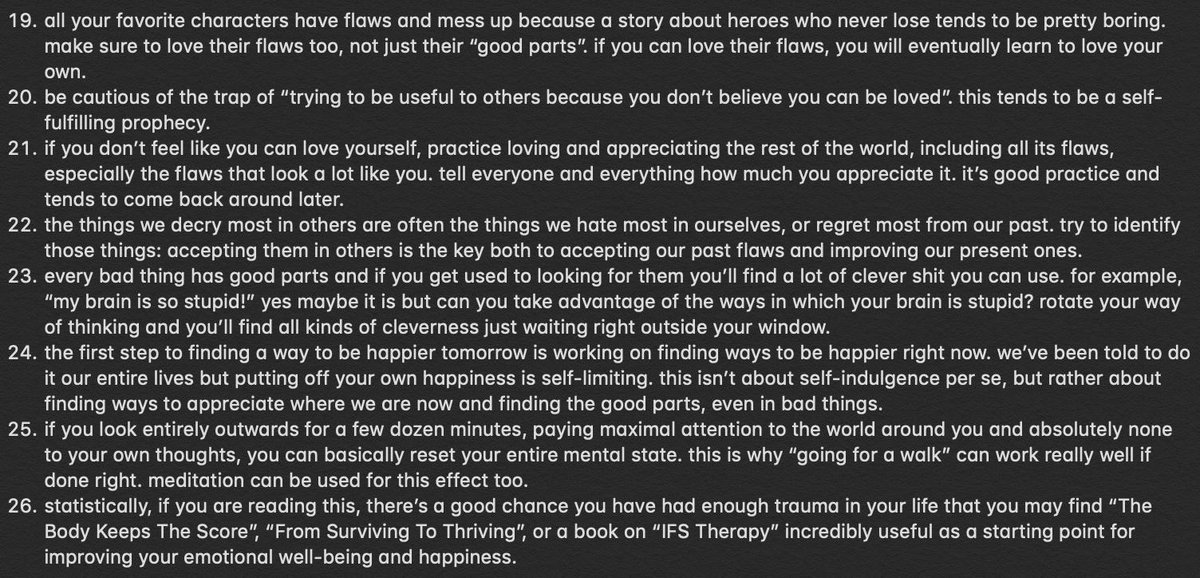@eevee over 1/3 of drugs have known interactions with the mitochondrial electron transport chain in some fashion. most are unexplored and some may even be a contributing factor to mechanism of action.
we mostly only notice them when people get idiosyncratic drug reactions.
we mostly only notice them when people get idiosyncratic drug reactions.
@eevee we have little to no idea how a large portion of psychiatric drugs work. even the mechanism of action of something as traditional as lithium is basically unknown.
@eevee SSRIs are judged in animal models with their acute effect, often in something like the "forced swim test". in humans, we judge them by their long-term effect after 2+ weeks and actively expect them to have no useful acute effect. there is no good justification for this
@eevee psychedelic drugs are viewed in popular culture as primarily recreational, but almost all of the most popular ones started as tools used in psychotherapy and treatment of trauma. this includes LSD (1950s), MDMA (1970s), and DMT/ayahuasca (thousands of years).
@eevee world war 2 was effectively a drug war. nearly every major military involved relied heavily on amphetamine or methamphetamine. they teach the blitzkrieg as some kind of strategic concept, but it's actually just the entire german army being on meth for a few weeks.
@eevee methamphetamine was a very popular ingredient for diet pills back in the mid 20th century. yes, FDA-approved ones. one of them was known as "obetrol". it was later rebranded as "adderall" after swapping out the 50% racemic methamphetamine for 50% racemic amphetamine.
@eevee knowing the human genome turned out to be way less useful for clinical practice than people thought. the vast majority of genetic variation is not as interesting as marketers say it is and most SNP association studies are probably the result of publication bias and p-hacking.
@eevee the main reason you can't get rid of viruses quite so easily is because they insert their DNA into cells in your body. some of that DNA is even inherited. your human genome contains active, functional viral DNA. this is probably important somehow.
@eevee viruses have the ability to perform "horizontal" gene transfer in this way -- to move genetic information between organisms in a way that completely bypasses normal reproduction and mutation.
this might actually be critical for evolution as a whole.
we don't know.
this might actually be critical for evolution as a whole.
we don't know.
@eevee the idea that "serotonin is the happy molecule" is a myth created almost entirely by pharma industry marketing. it has almost no basis in reality. more accurately, studies of primitive organisms suggest that it at the very least models resource availability.
@eevee the "chemical imbalance" theory of depression is, again, a myth largely created by marketing. there is very little evidence for it.
@eevee when pitched to the FDA, most antidepressants were never intended to be used for more than a few months. in trials, their efficacy was measured by their ability to achieve remission after being stopped.
@eevee lithium concentration in groundwater is negatively correlated with suicide rates.
@eevee much of the dopamine and serotonin are produced in the gut and have major effect there. the entire digestive system is regulated by serotonin.
@eevee when you're born, your heart closes connection to the umbilical cord when you draw first breath, using serotonin as a signalling molecule. thus it has serotonin receptors. if you stimulate them repeatedly, you get heart disease. this is what happened with phen-fen in the 90s.
@eevee remember vioxx? remember it being withdrawn for causing heart problems or whatever? remember all the lawsuits?
well it turns out that all the classic NSAIDs have comparable risk factors
they were just never studied as thoroughly because they were grandfathered in
well it turns out that all the classic NSAIDs have comparable risk factors
they were just never studied as thoroughly because they were grandfathered in
@eevee proton pump inhibitors (ex: prilosec) were never meant to be used long-term and can cause a host of health problems, including rebound heartburn. making them OTC was probably incredibly foolish.
@eevee angiotensin II blockers (ARBs) are a popular class of blood pressure lowering drugs. they also decrease the risk of alzheimer's by around 50%, completely independent of their effect on blood pressure. we have no idea why.
@eevee if you find yourself awake on too much benadryl, you might find yourself surrounded by evil shadow spiders coming out of the walls to eat you.
@eevee in large doses, nutmeg will have a similar effect. yes, nutmeg. that nutmeg.
this is extremely inadvisable. if you're reading this, please do not do it. you will probably find yourself in a lot of regret as the walls close in on you.
this is extremely inadvisable. if you're reading this, please do not do it. you will probably find yourself in a lot of regret as the walls close in on you.
@eevee it's well-known that blue light has effects on circadian rhythm and is used by the brain to judge day vs night.
but did you know it actually uses a third type of receptor in the eye, and even works in (at least some) blind people?
evolutionarily, it probably predates eyes.
but did you know it actually uses a third type of receptor in the eye, and even works in (at least some) blind people?
evolutionarily, it probably predates eyes.
@eevee C. elegans is a nematode known for having an extremely simple nervous system that is well-studied, with precisely 302 neurons. we still are nowhere close to being able to simulate and understand it. everyone who talks about meaningful "simulation" of human brains is a quack.
@eevee the vast majority of popular media articles reporting things like <X> food/chemical/drug causes <Y> benefit/disease have the phrase "in mice" or "in rats" hidden in them, shouldn't have been published, and are probably meaningless
@eevee many supposedly-beneficial chemicals are "promiscuous" molecules that have a tendency to react with nearly everything. this causes them to show up on chemical assays for nearly everything, usually as red herrings. resveratrol, that red wine chemical, is a notorious example.
@eevee i can add more here!
nicotine is actually not as well studied as you'd think. most studies about "nicotine" are actually about tobacco smoke, which has tons of psychoactive ingredients, including MAOIs.
for example, there isn't even much evidence on how addictive nicotine is.
nicotine is actually not as well studied as you'd think. most studies about "nicotine" are actually about tobacco smoke, which has tons of psychoactive ingredients, including MAOIs.
for example, there isn't even much evidence on how addictive nicotine is.
@eevee anticholinergic drugs, like benadryl, are known (by large correlation study) to be associated with dementia. this is reliable enough information that at-risk older folk are told to avoid regular use of such drugs.
we do not know why.
we do not know why.
@eevee nicotine, AFAIK, is associated with lower risk of dementia. it's a cholinergic (opposite of anticholinergic). why? we also don't know
@eevee both caffeine and nicotine are dopaminergic drugs that have been used as ADHD self-medication for long before the acronym "ADHD" existed.
think about how much of the past 500 years of world history has been driven by that one.
think about how much of the past 500 years of world history has been driven by that one.
• • •
Missing some Tweet in this thread? You can try to
force a refresh










